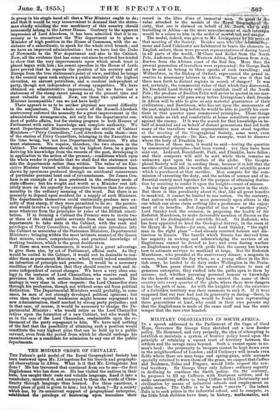THE MODERN ORDER OF CHIVALRY.
TILE Patron's gold medal of the Royal Geographical Society has been bestowed upon Mr. Livingstone for hid travels and geographi- cal observations in Africa. What is it that Mr. Livingstone has done ? He has traversed that continent from sea to sea—the first Englishman who has done so. He has visited the natives in their huts, has caught their rude and volatile language, fixed it into a vocabulary, mastered it, and conveyed to them the words of Chris- tianity through language thus learned. For these exertions, a round piece of gold is given to him ; but by whom P—By a society which has, by its consistent support of geographical enterprise, established the privilege of bestowing upon travellers their record in the libro d'oro of immortal-- men. -So great value attached to the medals of the(Enyal Geographic ciety, that one is claimed on behalf 4...Dr-Barth, who is travelling in Africa—as the mere announcement ok.such inte would be a solace to him in the midst of .m,petaktni iniffdan
The medal, indeed, was given to Mr. Livnigatpqe at
that meeting of the Society. Besides men 3wholike y- mour and Lord Colchester are habituated to brae the elements as English sailors, there were present representatives of daring travel in alt parts of the world,—M'Clure and Kellet from the North Pole, Anderson from South-Western Africa, Rawlinson from Asia, Burton from the African coast of the Red Sea. More than the present generation of travellers were represented : Sir George Back may be said to belong to three epochs of such travelling; and Wilberforce, in the Bishop of Oxford, represented the grand in- centive to missionary labours in Africa. What was it that led these men forth to distant regions in search of danger? It was not, certainly, the commercial value of that which they discovered. No Freehold Land Society will ever establish itself at the North Pole ; the produce of Boot hia Felix will never be quoted in our mar- kets; generations will pass away before Livingstone's dark friends in Africa will be able to give us any material guarantees of their civilization ; and Rawlinson, who has sat upon the monuments of the past, might look long before he would be able to justify his exer- tions in that quarter upon commercial principles. Those things which make us rich and comfortable at home constitute our power against the enemy. If it was the search for that knowledge on be- half of mankind and on behalf of distant generations that led forth many of the travellers whose representative men stood together at the meeting of the Geographical Society, some went even upon secondary objects—Dr. Rae, for example, went to discover where the body of Franklin lay.
The lives of those men it would be said—testing the question by commercial principles—lad been wasted : yet they have been sent out. Ledyard, Burckhardt, Park, and Franklin, have fallen ; and their compeers will still be sent while there remains an unknown spot upon the surface of the globe. The Geogra- phical Society will aid in sending them, because it is felt that the sacrifice of human life is worth the attainment of scientific power which is purchased at that sacrifice. Men compete for the com- mission of executing the duty, and the nobles of science and of in- fluential society meet together for the purpose of obtaining distinc- tion by assisting to confer it upon the knights-errant of science.
In our day positive science is rising to be a power in the state. But there is this peculiarity about it, that, like all great benefits to mankind, it cannot be limited to one nation. On the contrary, that nation which confers it most generously upon others is the which can alone claim nothing like a preference in the enjoy- ment of its benefits. Not forgetful of ties in "another place," Lord Stanley took the occasion, in proposing the health of Sir Roderick Murchison, to make favourable mention of Russia as the- patron of his distinguished scientific friend. Sir Roderick, who- has been appointed to head the Geological Survey, in the room of
Sir Henry de la Beche—for once, said Lord Stanley, "the right man in the right place "—had already received honour and dis- tinction in Russia. The benefit which Russia has derived from her sagacity in seeking and acknowledging the services of an Englishman cannot be denied to her ; and even during warfare an Englishman may reflect with pride that the enemy has known how to estimate services to mankind at large. But Sir Roderick Murchison, who presided at the anniversary dinner, a magnate in science, could recall the day when, as a young officer in the Bri- tish army, he landed to do duty under Wellington in the Penin- sula. When peace closed the career of adventure to men of generous enterprise, they rushed into the paths open to them by science; and, whether pursuing personal honour or knowledge for the benefit of mankind, they have carried the name of their country into every quarter of the globe where there were dangers to bar the path of man. As with the knights of old, the existence of a forbidden territory was their summons to seek it. If it were supposed that our race had lost its generosity or daring—there, in that quiet scientific meeting, would be found men representing three generations at least, who could in their own persons say that the Englishman is made of the same stuff and has the same temper that the race ever boasted.


























 Previous page
Previous page